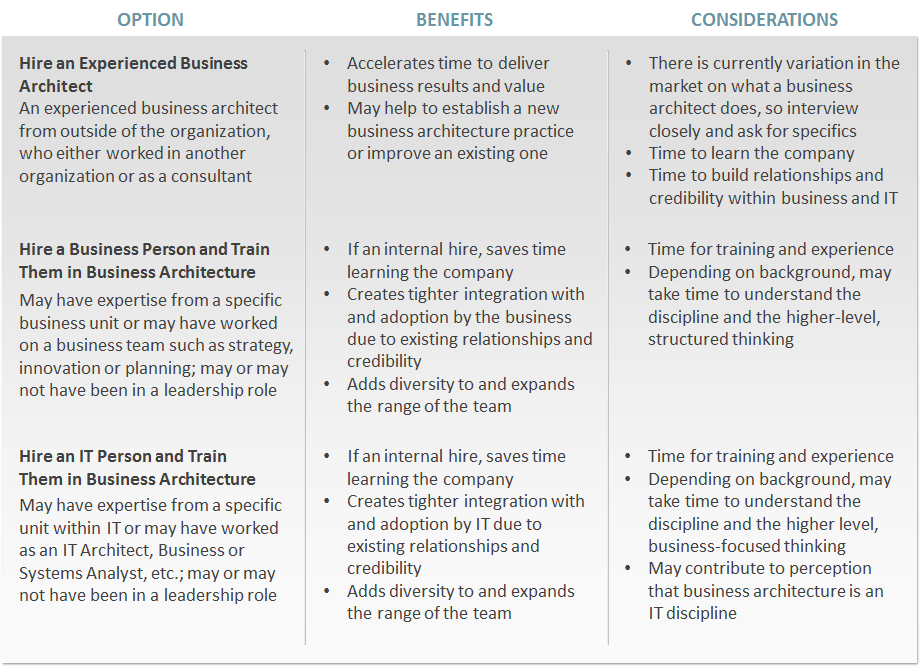Business architecture team structure, composition and advancement is top of mind as organizations establish their own internal business architecture practices. In a previous article, we explored the structure of an effective business architecture team, with a focus on where business architects are positioned, how they are organized, and how they collaborate. In this article, we will explore some of the most frequently asked questions related to team composition, including who to hire, how to find and create great business architects, and how many to hire.
Who Do We Hire?
Experience has shown us that diversity makes a business architecture team stronger. This not only makes hiring a business architect a more realistic endeavor, but a team that has a collection of skills and personalities performs better. Creating business architecture team diversity should be a deliberate goal and can be reflected in different ways.
- Roles and Competency Levels
Organizations often create different business architect roles (e.g. Business Architect, Senior Business Architect and Lead Business Architect) and potentially levels within each. The responsibilities across roles and levels may vary such as in scope, level of strategic advising, and mentoring/management responsibility. In addition, while many of the competencies are the same, the expected target level of competency may vary by role and level.Having a range of business architect role and competency levels on the team provides coverage for different types of business architecture engagements, gives business architects a clear career path, and balances out hiring and compensation needs. - Focus Areas
Whether explicitly described in their role description or not, business architects may have different focus areas such as the business subject areas they are responsible for architecting, the additional aspects of the practice they focus on (e.g. building the business architecture knowledgebase, defining methodology, training, etc.), and the related teams and scenarios within the strategy execution lifecycle they focus on (e.g. strategy translation, project or application portfolio management, etc.).Having a blend of focus areas ensures coverage of the necessary aspects to scale business architecture across the enterprise and mature the practice, and facilitates relationship building with a broad range of other teams. It also leads to better retention because business architects can draw upon their strengths, past experiences and passions. - Personas
Often related to their focus areas, business architects naturally have different personalities and interests. Some love to facilitate large group sessions and socialize the discipline across the organization, while others might enjoy perfecting the knowledgebase and solving problems in small groups.Building a business architecture team with diverse personas again ensures that the business architecture and practice needs are fully met, facilitates relationship building with a broad range of other teams, and leads to better business architect retention.
How Do We Find or Create Great Business Architects?
Since business architecture is still an emerging discipline, there is a high demand for a limited number of experienced business architects. This frequently leads to the question of who is best to hire for the role. A few options are shown below. Consider not only the ease of hiring, but also the importance of intentional diversity on the business architecture team by potentially utilizing all of these options. Organizations also leverage business architecture consultants to supplement capacity in the beginning or when there is a surge in resource need.

How Many Business Architects Do We Need?
While this question is asked frequently, it is hard to give a meaningful answer because it depends on the amount of change that an organization is planning or has in flight. While there is a minimum number of business architects needed to support a business architecture practice, this could greatly increase to support an organization which is undergoing significant enterprise-level transformation. This also means that the “right size” of the business architecture team may fluctuate over time.
There are a couple key variables though that can help you determine the number of business architects you need:
- Number of Business “Subject Areas”
Define the number of business “subject areas” in which you would like to have a business architect assigned. A subject area can be horizontal (e.g. a set of capabilities that apply across business units) or vertical (e.g. a business unit) and should be defined in a way which makes sense for your organization. A business architect may be assigned to one or more subject area depending on the size and amount of change needed.
- Practice Responsibilities
List out the responsibilities to be performed in order to establish and mature your internal business architecture practice and determine the resources needed to carry them out. This includes everything from building the knowledgebase, to hiring and training business architects, to socializing and integrating with related teams. The amount of resources needed to perform practice responsibilities may increase with time as the practice grows. Practice responsibilities can be assigned to a full-time resource(s) or shared across all business architects. Organizations with large business architecture practices typically have at least one full-time resource focused on the practice.
For both cases above, prioritize what you need in place now and estimate how it will evolve over time to inform your business architecture resource plan.
In Summary
The business architecture team is the heart of any successful practice and team composition is an essential component.
- Diversity is the key to a high performing business architecture team and should be an intentional goal. It ensures that the depth and breadth of business architecture needs are addressed, builds strong relationships and buy-in across the enterprise, and helps to retain business architects.
- Great business architects can come from anywhere—from within the organization or outside, and from within the architecture community, the business or IT.
- The right size of a business architecture team depends on the amount of change an organization is undergoing and may fluctuate over time, but is a function of business subject area coverage and practice resource needs.

















